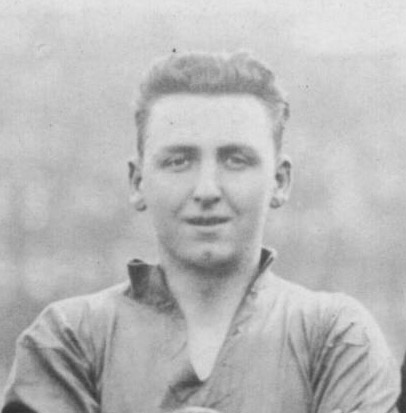

Reed: George
1924-1931
(Player Details)
Left Half
Born: Altofts, Nr Wakefield: 07-02-1904
Debut: Sunderland (h): 06-04-1926
5’8” 11st 2lb (1930)
Reed cost only a signing-on fee when he joined Leeds from Altofts in October 1924. He
broke into the first team halfway through the 1926-27 campaign and missed only eight games
in the next three and a half seasons. With Willis Edwards and Tom Townsley then later
Edwards and Ernie Hart, George Reed was a central figure in Leeds defence in the late 1920’s
and early 1930’s. He was quick, sharp in the tackle and a good passer of the ball. In April
1930 he shared a benefit game against Manchester United, with Harry Roberts, and then joined
Roberts at Plymouth Argyle in May 1931. With Argyle he made his debut on 12th September 1931
in a 3-3 draw with Bradford City and stayed at Home Park until the 1934 close season, playing
his final game on Boxing Day 1933 in a 1-2 defeat at Nottingham Forest at the age of
twenty-nine. In his time at Argyle he scored once in forty-six League appearances and also
played twice in the F.A. Cup without scoring. He battled with Alec Hardie and later Archie
Gorman for the Left Half position until he moved to Crystal Palace in 1934. However, he made
just two appearances for the South London Third Division South side before moving to Clapton
Orient a year later. Later he was Reserve team trainer at Palace, before the spell at Clapton
Orient, he made just a single appearance, in April 1936. He then moved to Non-League Kings Lynn
at the start of the 1936-37 season as player/coach/trainer and was Manager for eighty-six games
from 1936 to 1938. After the war he returned to Argyle as Assistant Trainer, ironically
replacing Archie Gorman, one of his old rivals for the number six shirt in his playing days at
the club. Reed remained with Plymouth until his death on 29th November 1958 at the age of
fifty-four. It came while still in the service of the club and was a huge shock to all at Home
Park. After his long service to the club he was still a valued member of the Argyle backroom
staff. Argyle had been drawn to play Coventry City in the Second Round of the Cup on 6th
December 1958 and he had been given the responsibility for compiling a scouting report on
Coventry in preparation for that upcoming Cup-tie. In the First Round Argyle had been held
2-2 at home by Gillingham on 15th November while Coventry had been easy winners by 5-2 at
Weymouth. So at the time of the draw it would have been Gillingham that were the favourites to
make the trip to the Cathedral City. Plymouth proved the bookies wrong with a resounding 4-1
win on the following Wednesday, 19th November, at Priestfield to book their place for the trip
to Coventry. So it was that Reed went to Highfield Road, Coventry, to run the rule over them in
their home game with Chester on 29th November 1958 and saw them 5-1 winners. His mission
complete he commenced the complicated journey back to Plymouth. This involved changing trains
at Bristol and it was there, whilst running for a train on his journey back he collapsed and
died of a heart attack. He had been a popular member of the club's backroom staff and a planned
testimonial match for Club Secretary Bert Cole was immediately forfeited in his favour. Past
and present members of the the club united at his funeral, with the team his pall bearers and
former 1930s team mates, including Frank Sloan, Bill Harper (then Head Groundsman) and Fred
Titmus, amongst the mourners.